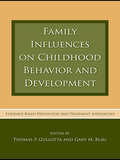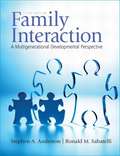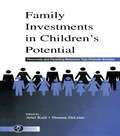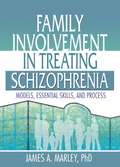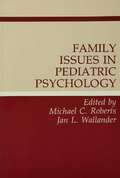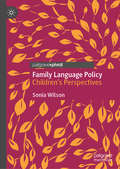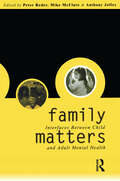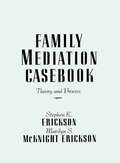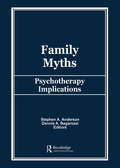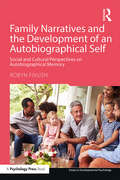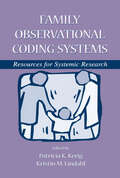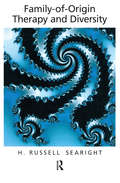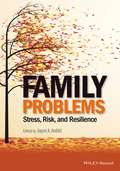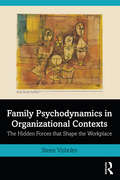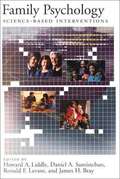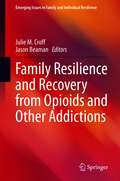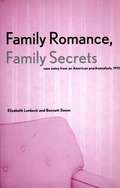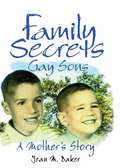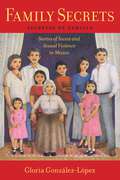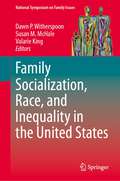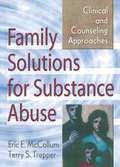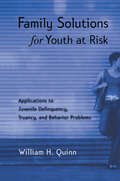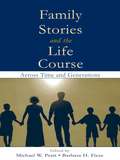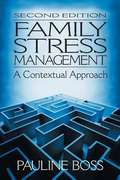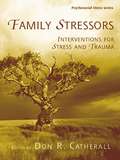- Table View
- List View
Family Influences on Childhood Behavior and Development: Evidence-Based Prevention and Treatment Approaches
by Thomas P. GullottaIrrespective of theoretical orientation, families matter. Families are the entity in which children are introduced to words, objects, shapes, and colors. Families are the people related in a myriad of conventional and unconventional ways that clothe, bathe, and feed its biological and acquired offspring. Influenced by race, ethnicity, income, and education, families relate not only to each other within the unit but to others in the neighborhood, the community, and beyond. This book is about families and their children. This book is about those times when the family unit experiences distress. This distress may be found in the serious illness of a child or a parent. It may be the result of a reconfiguration of the family as in divorce and remarriage. Or it may involve the harming of a family member sexually or physically. In this volume, the authors explore what family means today, what functions it serves, and those circumstances that can make family life painful. Importantly, the authors provide readers with clearly written information drawn from the most recent scientific investigations suggesting how the topics in this volume might be addressed to either ease that discomfort (treatment) or prevent its occurrence.
Family Interaction: A Multigenerational Developmental Perspective
by Stephen A. Anderson Ronald M. SabatelliExamines families - their challenges and successes - as they move through the life course. Family Interaction takes a family systems and a multigenerational, developmental framework. This text looks at the major conceptual models used to understand the patterns and interactional dynamics that operate in families. It provides readers with an overview of the basic tasks that all families must execute regardless of their particular composition or living situation and, at the same time, offers readers an appreciation of the variety and uniqueness in the ways in which each family develops its patterns of interaction.
Family Investments in Children's Potential: Resources and Parenting Behaviors That Promote Success (Monographs in Parenting Series)
by Ariel Kalil Thomas DeLeireThe papers in this volume bring together a cross-disciplinary mix of researchers--developmental psychologists, evolutionary biologists, economists, anthropologists, and sociologists--working on the common theme of investments in children. The interdisciplinary conceptual framework adopted by this collection of papers is loosely built around the idea that there are two broad dimensions of parental investments. These include resources (e.g., income, wealth) on the one hand, and behaviors (e.g., parental instrumental support and parental activities that promote warmth, socialization, and cognitive stimulation) on the other. Believing that parental investments yield a "return" in improved child and young adult outcomes, the papers discuss how parents differ in terms of the resources they have available to invest, the choices parents make, the behaviors they engage in, and relevant policy and program interventions. More specifically, core questions addressed by the authors include: Why do some families invest while others do not and are differential investment patterns related to biology, economics, or social factors? What constitutes a successful "investment portfolio?" How are "investments" measured and/or characterized? Are different investments interchangeable, compensating, or off-setting? Given a set of resources, why are some families able to make more effective investments in child outcomes? How well do these investments affect outcomes for children and for these children as young adults? Can interventions or public policies help families build assets or become "better" investors in their children's potential? Developing a better understanding of what investments matter, when they matter, and how resources can be successfully invested in children's potential is key to shaping efficient interventions and social policies. Knowledge of how parents invest and what strategies are effective may help policies which seek to further empower and enable parental involvement and choice for their children.
Family Involvement in Treating Schizophrenia: Models, Essential Skills, and Process
by James A. MarleyDiscover the importance of family in the treatment of schizophrenia! Family Involvement in Treating Schizophrenia: Models, Essential Skills, and Process is a vital resource for developing clinical skills and programs designed to increase family involvement in the treatment of schizophrenia. The book is a "hands-on" learning tool to be used as a broad overview of many intervention models and/or for a more focused look at a particular model with details of its use, implementation, and effectiveness. Dr. James A. Marley presents case studies and vignettes of each intervention model in action, highlighting specific techniques and skills. He also examines self-help and family advocacy programs, and addresses professional issues that have a direct impact on the provision of family services. Family Involvement in Treating Schizophrenia: Models, Essential Skills, and Process examines the practical application of family therapy when working with families coping with schizophrenia. The book addresses the importance of family involvement, the different types of intervention models that best serve the family, the founding principles behind the major intervention models, how to design and implement the right model, and how family issues impact service delivery. It includes recommendations for additional reading and listings of related Internet resources. Among the therapies examined include: psychodynamic Bowenian experiential structural strategic systemic/Milan cognitive-behavioral narrative solution-focused multiple families psychoeducational Family Involvement in Treating Schizophrenia: Models, Essential Skills, and Process is a primary source of information for clinicians and students that's equally effective as a professional resource and as a textbook. The book is invaluable as an aid to developing sensitivity to the special needs of families coping with this debilitating disorder.
Family Issues in Pediatric Psychology
by Michael C. Roberts Jan L. WallanderOver a relatively brief period of time pediatric psychology as an organized field has evolved and expanded as a science and in clinical practice. Reflecting a newer focus on family roles in health and illness, the present volume is relevant to a variety of fields because family issues and pediatric medicine inherently interact with numerous disciplines and approaches. This volume fills the need for a resource indicating research advancements that links pediatric psychology and pediatrics with family issues. The articles -- selected from special issues of Pediatric Psychology -- cover such topics as chronic illnesses and handicapping conditions, failure to thrive, spina bifida, recurrent abdominal pain, and health promotion. These pediatric conditions are considered in terms of concomitant psychosocial effects on parents and siblings, family resources and environment, adjustment and maladjustment, interventions and programming utilizing and assisting families.
Family Language Policy: Children’s Perspectives
by Sonia WilsonThis book explores the question of family language policy in multilingual households. Presenting six case studies which focus on the experiences of parents and children in French-English bilingual contexts, the author draws conclusions about the impact of parental language management on the family as a whole which can be applied to transnational families from other linguistic backgrounds. While many parental guides on bilingual childrearing have been published in recent years, little attention has been paid to the possible impact of such language strategies on the experiences and interrelationships of bilingual family members. This book is unique in focusing in depth on the psychology and experiences of the child, and it will be of interest to readers in fields as diverse as sociolinguistics, language policy and planning, sociology of youth and family, and child psychology.
Family Matters: Interfaces between Child and Adult Mental Health
by Peter Reder Mike McClure Anthony JolleyFamily Matters focuses on research and clinical material which bridges the traditional gap between child and adult mental health. Rather than considering child and adult problems separately, the authors address the often complex interactions between the two, covering such topics as: · The implications of childhood trauma in later life · The impact of parental mental health problems on children · How interactions within a family can affect the mental health of all individuals within the family The authors review existing research and cover their own recent studies and practical experience, and put forward new theoretical models to underpin their recommendations for changes in practice, such as liason initiatives between child and adult services and specialised services to treat adolescents, parenting breakdown and perinatal psychiatric illness.The findings and recommendations in Family Matters have have important implications for the organsiation and funding of mental health and related services, and staff training, and should be read by all those in professions concerned with child and adult mental health, including psychiatrists, family therapists, psychotherapists, nurses, health visitors and social workers, and health service managers.
Family Mediation Casebook: Theory And Process
by Stephen K. Erickson Marilyn S. McKnight EricksonFirst published in 1989. Routledge is an imprint of Taylor & Francis, an informa company.
Family Myths: Psychotherapy Implications
by Dennis Bagarozzi Stephen A AndersonTherapists can broaden their point of view and expand their options for treating individuals, couples, and families by understanding family myths. Here is a thorough and unique compilation of current studies on the development, evolution, and clinical implications of family myths. An outstanding group of international experts offers a variety of formulations regarding both personal and family myths in an attempt to bridge the chasms between individual, couple, and family systems dynamics. They focus on the conscious and unconscious elements of families’shared perceptual experiences and their relationship to behavioral, interactional patterns of individuals, couples, and family systems. The detailed descriptions of various clinical approaches to re-editing clients’personal, conjugal, and family myths will be enormously helpful to clinicians, theorists, trainers, and educators.
Family Narratives and the Development of an Autobiographical Self: Social and Cultural Perspectives on Autobiographical Memory (Essays in Developmental Psychology)
by Robyn FivushStories are central to our world. We form our families, our communities, and our nations through stories. It is through stories of our everyday experiences that each of us constructs an autobiographical self, a narrative identity, that confers a sense of coherence and meaning to our individual lives. In this volume, Robyn Fivush describes how this deeply personal autobiographical self is socially and culturally constructed. Family Narratives and the Development of an Autobiographical Self demonstrates that, through participating in family reminiscing, in which adults help children learn the forms and functions of talking about the past, young children come to understand and evaluate their experiences, and create a sense of self defined through individual and family stories that provide an anchor for understanding self, others, and the world. Fivush draws on three decades of research, from her own lab and from others, to demonstrate the critical role that family stories and family storytelling play in child development and outcome. This volume is essential reading for students and researchers interested in psychology, human development, and family studies.
Family Observational Coding Systems: Resources for Systemic Research
by Patricia K. Kerig Kristin M. LindahlCODING MANUAL INFORMATION IS AVAILABLE FROM THE CHAPTER AUTHORS, AND THEIR E-MAIL ADDRESSES CAN BE FOUND ON PAGE XV OF THE BOOK.Family studies is an area that has enjoyed the benefits of conceptual and methodological advances in recent years including the widespread adoption of observational research techniques. The selection of an appropriate coding system is critical to achieving a better understanding of the complex family processes related to normative and pathological development. This book presents 14 examples of family observational coding systems, chosen for the wide range of constructs and phenomena they capture. Each system is described in detail, and excerpts from the coding manual are presented (links to the full coding manuals are available to purchasers of the book at LEA's Web site, www.erlbaum.com). Each chapter follows a consistent outline, so that the different coding systems can be more easily compared to one another. They include the theoretical underpinnings of the measure, its reliability and validity, the coding process, strategies for coder training, and examples of studies in which it has been used. This volume will prove invaluable to students and researchers in family studies, clinicians, and other practitioners who need to interpret data from family observations.
Family Of Origin Therapy And Cultural Diversity
by H. Russell SearightFirst published in 1997. Routledge is an imprint of Taylor & Francis, an informa company.
Family Problems: Stress, Risk, and Resilience
by Joyce A. ArdittiFamily Problems: Stress, Risk, and Resilience presents an interdisciplinary collection of original essays that push the boundaries of family science to reflect the increasingly diverse complexity of family concerns in the modern world. Represents the most up-to-date family problem research while addressing such contemporary issues as parental incarceration, same sex marriage, health care disparities, and welfare reform. Features brief chapter introductions that provide context and direction to guide the student to the heart of what’s important in the piece that follows. Includes critical thinking questions to enhance the utility of the book for classroom use. Responds to family problem issues through the lens of a social justice perspective.
Family Psychodynamics in Organizational Contexts: The Hidden Forces that Shape the Workplace
by Steen VisholmThis fascinating book shows how an understanding of the psychodynamics of the extended family, from parental relations to sibling rivalries, can provide insight into many of the key issues faced by organizations today. Covering topics such as change management, creativity, autonomous groups, leadership and democracy, it shows how deep-rooted family dynamics unconsciously frame the way we relate to each other in the workplace, and how they can have a profound influence on the broader trajectory of organizations. This book features: Examples on how to use the extended family as a framework for understanding organizational behaviour. A look beyond parental relationships to discuss sibling relationships as well. Examples to illustrate key topics of practical relevance to consultants and managers. Family Psychodynamics in Organizational Contexts is an important read for students and scholars of organizational psychology, organizational studies and psychodynamics, as well as consultants and coaches working in organizational contexts.
Family Psychology: Science-Based Interventions
by Howard A. Liddle Daniel A. Santisteban Ronald F. Levant James H. BrayThe editors provide a thorough and concise historical overview of the science of family intervention, which is considered the applied branch of family psychology.
Family Resilience and Recovery from Opioids and Other Addictions (Emerging Issues in Family and Individual Resilience)
by Julie M. Croff Jason BeamanThe book examines the relationship between family resilience and recovery from substance use disorders. It presents information on etiology of substance use disorders within the family system as well as new research on resilience in addiction recovery. The book facilitates the development of evidence-based resilience practices, programs, and policies for those working or dealing with families and addiction.Key topics addressed include: Protecting workers from opioid misuse and addiction. Neuroscience-informed psychoeducation and training for opioid use disorder. New models for training health care providers. Role of families in recovery capital. Family Resilience and Recovery from Opioids and Other Addictions is a must-have resource for researchers, professors, and graduate students as well as clinicians and related professionals in family studies, public health, and clinical psychology and all interrelated disciplines, including behavioral health, social work, and psychiatry.
Family Romance, Family Secrets: Case Notes from an American Psychoanalysis, 1912
by Elizabeth Lunbeck Bennett SimonThis book includes comments by Elizabeth Lunbeck on sessions of cases of trauma and incest.
Family Secrets: Gay Sons - A Mother's Story
by Jean M BakerAs a clinical psychologist, Jean Baker had always considered herself open-minded and tolerant, but found she wasn’t prepared for the revelation that her only two children were both gay. Family Secrets is an inspirational story of how she and her family learned to accept one another and overcome their internalized fears and prejudices as well as how they coped with a much greater challenge in their personal lives--HIV/AIDS. Family Secrets is more than a parenting memoir, however. It is a guide that draws upon research and scientific findings to capsize the myths and stereotypes that contribute to societal homophobia. It offers important insight into the developmental needs of gay children, and it discusses the issues faced by gay and lesbian youth and their families.Offering practical suggestions about how parents and schools can help gay, lesbian, and bisexual children grow up to be productive, psychologically healthy adults, Family Secrets discusses the effects of social prejudice and stigma on the social and emotional development of sexual minorities. As long as homophobia is running rampant in American society, gay children are going to be reluctant or afraid to confide in their parents, and parents will have trouble understanding and accepting homosexuality in their children. To end the secrecy and build open and healthy environments for all children and adolescents, this book discusses: tactics for reducing homophobia in non-gay youths promoting tolerance and understanding of sexual minorities at home and in school the effects an AIDS death has on families “coming out” about HIV/AIDS discussing homosexuality with your children, regardless of whether or not they are gay or lesbian sexual orientation and the interaction of biology with experienceBecause Family Secrets is written from the viewpoint of a parent/psychologist, it offers insights into the developmental needs of gay and lesbian children in a way that no other book has done. School counselors, psychologists, marriage and family counselors, teachers, school administrators, and the parents and siblings of gays and lesbians will all benefit from reading this honest, helpful, and encouraging book.
Family Secrets: Stories of Incest and Sexual Violence in Mexico (Latina/o Sociology #1)
by Gloria González-LópezReal, personal accounts of sixty Mexican women and men affected by incest and sexual violence. In Family Secrets, Gloria González-López tells the life stories of women and men in Mexico whose lives were irrevocably changed in the wake of childhood and adolescent incest. In Mexico, a patriarchal, religious society where women are expected to make themselves sexually available to men and where same-sex experiences for both women and men bring great shame, incest is easily hidden, seldom discuessed, and rarely reported to authorities. Through a gripping, emotional narrative, González-López brings the deeply troubling, hidden, and unspoken issues of incest and sexual violence in Mexican families to light. She contends that family and cultural structures in Mexican life enable incest and the culture of silence that surrounds it. She examines the strong bonds of familial obligation between parents and children, brothers and sisters, and elders and youth that, in the case of incest, can morph into sexual obligation; the codes of honor and shame reinforced by tradition and the Church, discouraging openness about sexual violence and trauma; and the double standards of morality and stereotypes about sexuality that leave girls and women and gender nonconforming boys and men especially vulnerable to sexual abuse. A riveting account, Family Secrets turns a feminist and sociological lens on a disturbing issue that has gone unnoticed for far too long.
Family Socialization, Race, and Inequality in the United States (National Symposium on Family Issues #14)
by Valarie King Susan M. McHale Dawn P. WitherspoonThis book examines the ways in which families can address racial and ethnic inequalities and racism and the impacts of these systems on health, education, and other family and family member outcomes. It addresses the historical context of race and racism in the United States, ethnic-racial socialization in families of color, and White parents’ attitudes and practices related to antiracist socialization. Chapters describe structural racism, debunk the myth of racial progress, and explore the representation of race and racism in family research; provide a historical account of ethnic-racial socialization literature, propose a model of ethnic-racial socialization of Latinx families; describe how racial socialization can be used therapeutically; and address White normativity, expand models of White racial socialization and learning, and grapple with the complexities of antiracist socialization. Finally, the volume offers recommendations for the field of family research to meaningfully include race and racism as well as provides suggestions for translational work in this area related to policies, programs, and practice. Featured areas of coverage include:Ethnic and racial socialization among families of color.White racial socialization and racial learning.Antiracist socialization.Opportunities for family research on race and racism to be used to enhance family policies and intervention programming.Family Socialization, Race, and Inequality in the United States is a must-have resource for researchers, professors, clinicians, professionals, and graduate students in developmental psychology, family studies, and sociology, as well as interrelated disciplines, including demography, social work, prevention science, public health, educational policy, political science, and economics.
Family Solutions for Substance Abuse: Clinical and Counseling Approaches
by Terry S. Trepper Eric E. MccollumUse goal-oriented techniques for successful family therapy with substance abusers! Family therapy is an essential core competency for substance-abuse counselors, according to the Substance Abuse and Mental Health Services Administration. Family Solutions for Substance Abuse: Clinical and Counseling Approaches delivers the information and techniques you need to effectively treat addicts and their families. By understanding and changing the dynamics of the family system, you will be better able to guide your clients to adopt strategies and behaviors that sustain recovery and maintain healthy relationships. Family Solutions for Substance Abuse provides clear models of diagnosis and intervention for families, whether that means couples, teenagers and their parents, or Mom, Dad, and the kids. The theoretical background on family systems will help you understand the context of the client's addiction and the way it affects and is affected by other family members. Numerous case studies and figures bring the expert advice and theory into the practical realm so you can choose the best strategies for helping the shattered family heal. Family Solutions for Substance Abuse will teach you useful therapeutic skills and strategies, including: understanding interdependence joining with different family members negotiating goals and contracts dealing with family violence assessing motivation handling relapses ending treatment Treating addictions is notoriously difficult for even the most skilled therapist working with the most motivated client. Using the techniques in Family Solutions for Substance Abuse offers you and your clients a better chance at success, because addicts whose families share their treatment are much more likely to stay in counseling and remain clean and sober.
Family Solutions for Youth at Risk: Applications to Juvenile Delinquency, Truancy, and Behavior Problems
by William H. QuinnDr. Quinn provides a review on related research and programs and effectiveness. A presentation of the model program provides most of the materials an individual or agency would need to begin to implement the program. A practitioner might take activities from the model program and integrate them into an existing program.
Family Stories and the Life Course: Across Time and Generations
by Michael W. Pratt Barbara H. FieseThis edited book draws from work that focuses on the act of telling family stories, as well as their content and structure. The process of telling family stories is linked to central aspects of development, including language acquisition, affect regulation, and family interaction patterns. This book extends across traditional developmental psychology, personality theory, and family studies. Drawing broadly on the epigenetic framework for individual development articulated by Erik Erikson, as well as on conceptions of the family life cycle, the editors bring together contemporary examples of psychological research on family stories and their implications for development and change at different points in the life course. The book is divided into sections that focus on family stories at different points in the life cycle, from early childhood and the beginnings of narrative skill, through adolescence, young adulthood, midlife, and then mature adulthood and its intergenerational meaning. During each of these periods of the life cycle, research focusing on individual development within an Eriksonian framework of ego strengths and virtues is highlighted. The dynamic role of family stories is also featured here, with work exploring the links between family process, intergenerational attachment, and storytelling. Sociocultural theories that emphasize how such development is situated in the wider cultural context are also featured in several chapters. This broad lifespan developmental focus serves to integrate the exciting diversity of this work and foster further questions and research in the emerging field of family narrative. The book is intended primarily for researchers and advanced-level students in the fields of developmental and personality psychology, as well as those in family studies and in gerontology. It may also be of interest to those in the helping professions who are concerned with family therapy and family issues, and may--due to its content and illustrative material--have appeal to a wider market of the lay public. The chapters are written in a readily accessible style and the analyses are presented in a fairly non-technical way. Because family stories are charted across the lifespan, it would be a suitable companion book to a more traditional lifespan textbook in certain courses.
Family Stress Management: A Contextual Approach (Second Edition)
by Pauline BossIn this Second Edition, the author continues to explore both the larger context surrounding families and stress and the inner context, which includes perceptions and meanings. The author emphasizes the need for a more general contextual model of family stress and crises than other models. The goal is to provide a framework for students and professionals engaged in helping families learn how to manage their stress.
Family Stressors: Interventions for Stress and Trauma (Psychosocial Stress Series #No. 29)
by Don CatherallFamily Stressors: Interventions for Stress and Trauma by Don Catherall
